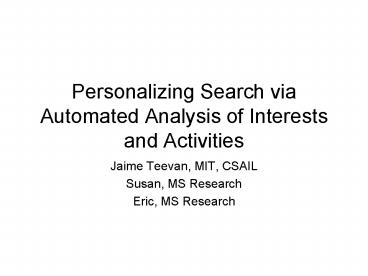Personalizing Search via Automated Analysis of Interests and Activities
1 / 13
Title:
Personalizing Search via Automated Analysis of Interests and Activities
Description:
Focused on re-ranking the top research results locally. ... 15 participants, top 50 search results. For 10 self-selected Queries. 2 way to evaluate queries ... – PowerPoint PPT presentation
Number of Views:14
Avg rating:3.0/5.0
Title: Personalizing Search via Automated Analysis of Interests and Activities
1
Personalizing Search via Automated Analysis of
Interests and Activities
- Jaime Teevan, MIT, CSAIL
- Susan, MS Research
- Eric, MS Research
2
Outline
- Introduction
- Pursuit of Personalization
- Corpus, User, Doc Query Representation
- Evaluation Framework
- Results
- Conclusion Future Work
3
Introduction
- Web search for IR returns a wide range of
results etc. - Beyond the commons Investigating the value of
personalizing Web search. (workshop on new
technologies for PIA 2005) - They found that there is an opportunity to
achieve significant improvement by
custom-tailoring search results to individuals,
and were thus motivated to pursue search
algorithms that return personalized results
instead of treating all users the same.
4
Pursuit of Personalization
- Focused on re-ranking the top research results
locally. - They explored Web search personalization by
modifying BM25 as their Probabilistic weighting
scheme. - Corpus representation N, ni
- User representation R, ri
- Doc Query representation terms
5
Corpus, User, Doc Query Representation
- Corpus Representation
- Full-text VS Title Snippet
- User Representation
- A rich index of personal content that captured a
users interests and computational activities - Within last month VS Full index of documents
- Doc Query Representation
- Full-text VS Title Snippet
6
Evaluation Framework
- 15 participants, top 50 search results.
- For 10 self-selected Queries
- 2 way to evaluate queries
- Collected a total of 131 queries
- DCG (Discounted Cumulative Gain)
- Rank(D1,..Dn), Relevance(3,2,3,0,0,1,2,)
7
Results
- One-way effects in which we hold all but one
variable constant. - Baseline Comparisons
- Combining Rankings
8
One-way effects
- F2
9
Best combination of parameters for personalized
search
- Corpus Representation Approximated by the
result set title and snippets. - User Representation Built from the users
entire personal index. - Document Query Representation Documents
represented by the title and snippet returned by
the search engine, with query expansion based on
words that occur near the query term.
10
Baseline Comparisons
- F3
11
Combining Rankings
12
Conclusion
- They have investigated the feasibility of
personalizing Web search by using an
automatically constructed user profile as
relevance feedback in their ranking algorithm. - Better than explicit relevance feedback.
- Its possible to approximate the corpus, making
efficient client-side computation feasible.
13
Future Work































